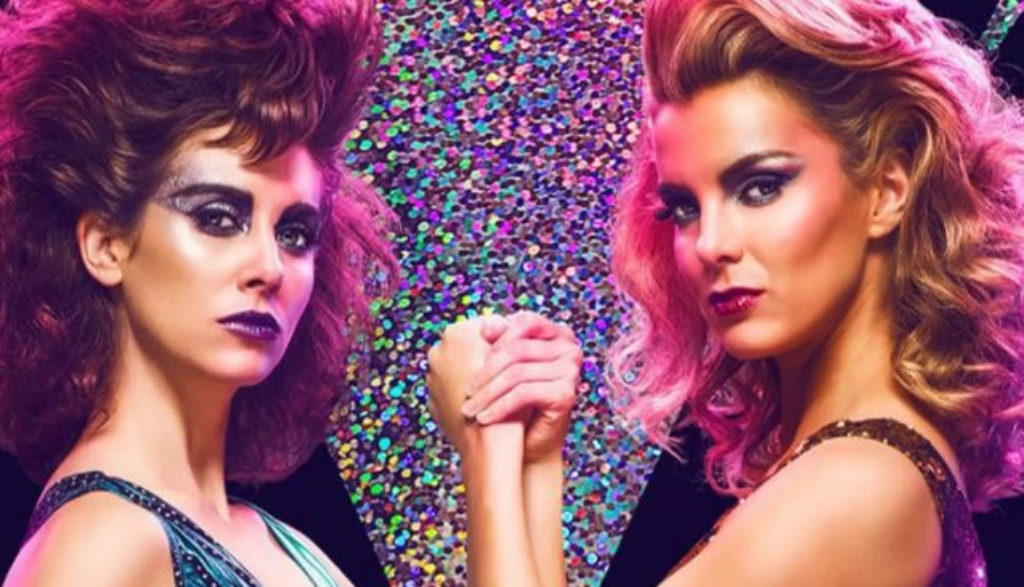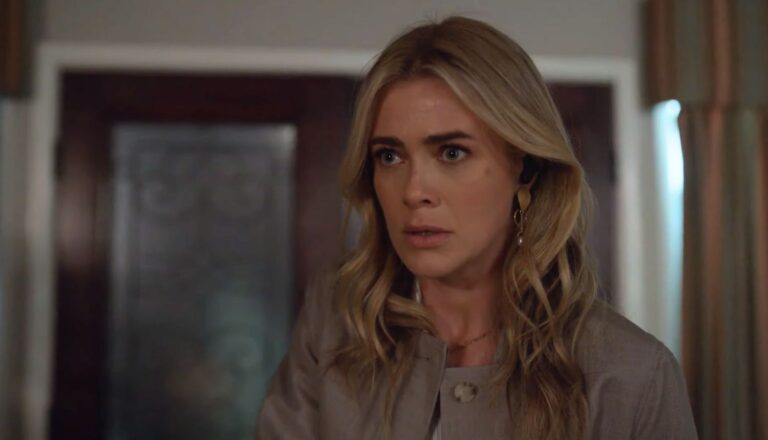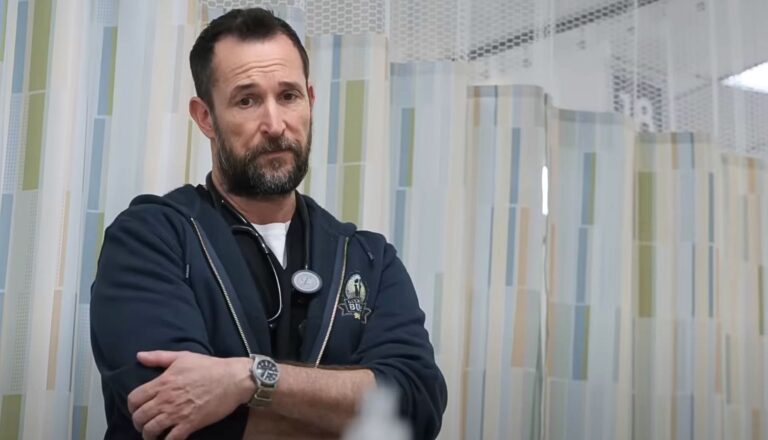
The Night Manager
Does it take a thief to catch a thief? Does it take lots of bad content to make a good TV show?

Ruth Wilder doesn’t think much about a glass ceiling where she works. No, it’s the flying metal chairs she worries about.
The former out-of-work actress is now known as Zoya the Destroya, the prime villain in the 1980s all-female pro-wrestling franchise known as the Gorgeous Ladies of Wrestling (or GLOW). Her character reads Marx in the morning and Lenin at night. She marches up to the arena in Soviet fatigues and, when she wrestles, she’s bedecked all in red. Of course. Naturally, Zoya often faces Liberty Belle—the star-spangled, true-blue beaut who’ll whup that commie with good old-fashioned American ingenuity any chance she gets.
This qualifies as nuanced characterization in this low-rent wrestling world, by the way. Zoya and Belle might sometimes grapple with Britannica, a super-smart scientist/wrestler who’s trying to bring a male mannequin to life. Or perhaps they’ll take on the massive Welfare Queen, who’s prone to steal props. (Never mind that the woman who plays the on-the-dole damsel is sending her son to Stanford.)
But all’s fair in love and wrestling, right? And hey, these women have to make a living somehow.
Zoya and Belle may not be fighting a Cold War in the real world, but their relationship has been a bit chilly in the past—understandably so, perhaps, given that Ruth once had an affair with the actual husband of the other woman (real name: Debbie Eagan). That real-world tension between the two landed Ruth her wrestling gig and helped propel them both to center stage. Why, Debbie is one of GLOW’s producers these days. Ruth helps run things too at times, down to writing the occasional script. And while they may be bitter enemies in the ring, they’re now good friends out of it. Most of the time.
Their relationship is a microcosm of this show’s strange, sequined world. Sure, the action in the ring is scripted. But it doesn’t hold a figure-four leglock to the drama that takes place outside it. Many of the wrestlers have husbands and kids; and their new, spandex-laden careers making picking up the kiddos from school pretty difficult. And let’s be honest, this wrestling business is hard—not just hard on the noggin (as it’s being pounded into the surprisingly springy floor), but hard on the psyche, too. And the enterprise doesn’t have deep pockets: It relies on the directorial expertise of former exploitation movie maestro, Sam Syvlia; the marketing genius of creator Bash Howard; and the ingenuity and dedication of its wrestlers.
Perhaps it’s no surprise that GLOW’s wrestlers have bonded so tightly with one another. With them away from their own families for much of the time, they’ve found one another in each other.
But family and friendship go only so far.
If Netflix’s Stranger Things is built to remind us of more innocent aspects of 1980s pop culture—Steven Spielberg, Back to the Future, video game arcades—GLOW (based on a real women’s wrestling association) points to a different side of ’80s Americana: big hair, bigger drug habits and a not-insignificant dose of jingoism.
Back in the 1980s, we thought nothing of watching cultural stereotypes do fake battle in a ring. Rocky was fighting Russian überman Ivan Drago. Hulk Hogan was pile-driving Nikolai Volkoff and the Iron Sheik. Straw dogs fell by the dozens, and nothing felt particularly wrong about it at the time. We live in a different time now, and all those stereotypes feel a little embarrassing—an emotion the show is gunning for.
But if the show holds up some past attitudes for ridicule, it embraces some current attitudes very much in vogue. Two of the female wrestlers, for instance, are in a lesbian relationship, and we’re seeing evidence that GLOW producer Bash is gay, too. (Never mind that he married one of his female wrestlers at the end of the second season.)
Heterosexual relationships are more common—even if many last less than an evening. Sex and nudity don’t enter the ring in every episode, but they’re always ringside—just waiting for the opportunity to come in. Star Alison Brie (who plays Ruth) suggests that Season 3 (which was released in its entirety Aug. 9, 2019) might be the sexiest yet.
“The whole cast, all of the characters, are really embracing what it means to be in Las Vegas (where this season is set) and the idea of what happens in Vegas, stays in Vegas,” she told United Press International.
Characters drink and smoke. Sometimes they dabble in drugs. One wrestler, under the influence of cocaine, broke another’s ankle during Season 2. Language can be only slightly less raunchy than you’d hear in a 1980s-era Eddie Murphy or Richard Pryor stand-up routine.
All of this diminishes a show that manages to be spritely, funny and surprisingly sweet. Truth is, GLOW does glow at times. But the show’s flying chairs of content make this a difficult ring to climb into.
The GLOW ladies are about to open up a new show in a Las Vegas casino. Ruth and Debbie (clad in their in-ring guises of Voya the Destroya and Liberty Belle) do a promotional gig on live TV—making nationalistic jabs at each other as the space shuttle takes off. But when the shuttle, the Challenger, explodes, the tragedy not only casts a pall on the interview, but on opening night as well.
Many of the jokes the ladies rip through on air feel (and are meant to feel) horrifically tasteless, given our foreknowledge of the Challenger’s fate. The show continues to play on our disaster-predicated discomfort: The opening-night party was space-themed, for instance, and promoter Bash Howard freaks out when he sees the space shuttle-themed cake. We hear and see several other awkward references regarding race and culture—again meant to draw a wince or two from viewers. One Asian member of the troop, for instance, enters the ring dressed as a giant fortune cookie.
That wrestler is wearing more clothes than most. Characters dress in a variety of getups that showcase curves and reveal cleavage, midriff and leg. One lesbian wrestler ogles a pair of towering, sparkly, barely-dressed Vegas showgirls. (“So you’re into tall girls now?” her girlfriend asks. “I’m into whatever is happening here,” she quips.) The two women kiss elsewhere. Bash and his wife smooch mightily before falling out of the camera’s view, apparently to have sex. Debbie and a valet recognize each other, and it’s clear from the conversation that the two slept together. Ruth and the show’s director, Sam, nearly kiss (even though Ruth is already in a relationship). We hear a couple of double entendres and a reference to a cake shaped like the male anatomy.
Someone burns spiritually cleansing incense around a dressing room and suggests bringing in a Buddhist monk to bless the area. Wrestlers hold a moment of silence for the Challenger, but that moment descends into giggling and a balloon fight. We hear a reference to Cerberus, the three-headed dog of the Greek underworld. We also hear a reference to Mormonism.
Wrestlers walk gently through rehearsals (lackadaisically mimicking a wrestling move or two), and Ruth/Voya gets spanked by another wrestler. (The fake assailant says that she’s going to make “your bottom red, just like your politics!”)
Several characters smoke, and two sip whiskey. Bash laments that he forgot to get drugs for his opening-night party. (His wife reminds him that Bash already got some from the valet, so it’s all covered.) Characters use the f-word a dozen or so times, and the s-word another four. We also hear “a–,” “b–ch” and “h—,” along with about seven misuses of God’s name.

Paul Asay has been part of the Plugged In staff since 2007, watching and reviewing roughly 15 quintillion movies and television shows. He’s written for a number of other publications, too, including Time, The Washington Post and Christianity Today. The author of several books, Paul loves to find spirituality in unexpected places, including popular entertainment, and he loves all things superhero. His vices include James Bond films, Mountain Dew and terrible B-grade movies. He’s married, has two children and a neurotic dog, runs marathons on occasion and hopes to someday own his own tuxedo. Feel free to follow him on Twitter @AsayPaul.

Does it take a thief to catch a thief? Does it take lots of bad content to make a good TV show?

The Hunting Party is far from the most gruesome drama on television, but its disturbingly inventive ways of killing may make viewers a bit queasy.

Max’s hospital drama ‘The Pitt’ strives to be medically accurate. While a noble goal, this show comes with a whole lot of content, too.

Netflix’s ‘Seven Dials’ (and the Agatha Christie book it’s based on) is filled with peril and suspicion. And more death is coming.